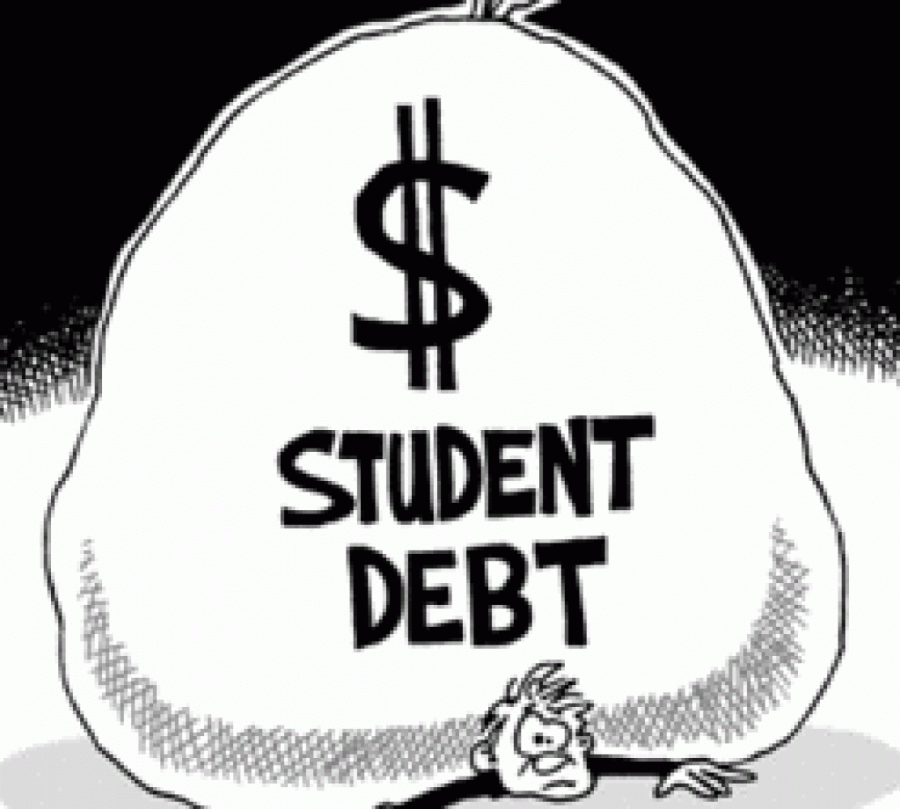Opinion: Student loans might be forgiven?
As President Trump enters the fourth year of his term, new presidential candidates are doing anything and everything to make themselves known. The first tier Democrat presidential candidates have used their stances on student debt to stay in the spotlight. The topic of student debt, even within the Democratic party, is controversial. It appears that if you don’t believe that all student debt should be absolved, you are no longer a part of the left. Instead you are pushed into a category that can only be described as “moderate limbo,” where you’re hated and berated by both opposing parties. That being said, let’s learn about the candidates.
Joe Biden:
Former Vice President Biden (under the Obama administration), is known to have more moderate views on student debt. He believes that debt should be forgiven if you enter civil service, and that teachers should not have to pay their student debt, as they are educating the next generation. His plan also takes a proactive approach to student debt by making it easier for high school students to take college credits resulting in their four year degree costing significantly less. He also wishes to create programs that would let high school students earn industry credits that would make it more likely for graduates to become employed right off the bat.
Pete Buttigieg:
Buttigieg actually owes around $130,000 in student debt himself! I believe this makes him more qualified to speak on this topic. He thinks that the cost of college should be lowered, but not made free. He does not think that all student debt should be cancelled, due to the extreme cost. Buttigieg believes that all students from low income families should be able to attend public college debt free. He also plans to expand Pell grants.
Amy Klobuchar:
Klobuchar, like Biden, has a moderate view on student debt. She does not believe in widespread debt forgiveness, but does think debt repayment should be more fair. She proposes lower interest rates on student loans, and making community college free.
Elizabeth Warren:
Warren would allow students with household incomes under $100,000 to cancel up to $50,000 in student debt. The more money over $100,000 your family makes, the less of your debt would be absolved. She, like the other candidates, also believes that public college should be free. Her plan would impose a 2% annual wealth tax on households that have a net worth over 50 million dollars.
Bernie Sanders:
Sanders is a familiar face for many, as he ran in the last election. His plan for student debt is in my opinion, the most extreme. He wishes to absolve the 1.6 trillion dollars in debt that 45 million people in the United States owe. The forgiven debt would not be taxed as it would not be classified as an income. Sanders’ plan would also allot 48 billion dollars to make public colleges and trade schools free. He plans to get the money through a bill that would tax Wall Street stock and bond transactions.
Disclaimer: The rest of this article is solely my opinion, I am not an expert, and I also am right leaning.
In my personal opinion, if I had to choose a candidate’s plan it would be Joe Biden’s. His plan tries to limit the cost of college by getting as much as possible completed in high school, where it costs less. However, I do not think that people working in the civil service should not have to pay for college. There are already so many benefits of working in the civil service such as job security and guaranteed pensions. To only grant free college to people in the civil service would be unfair.
Bernie is the person who comes to most people’s minds when the topic of student debt loans come up. Saying that you will cancel all debt is a bold move. I think it may be a little too bold, and will result in a monstrous amount of debt held by our country. Even if the tax on Wall Street passes, it’s still a lot of debt our country will hold until the debt gets chipped away. Bernie’s proposal involves a lot of wishful thinking to say the least.
Pete Buttigieg is the most realistic candidate. He shoulders a lot of student debt himself, yet knows that cancelling all debt would be a bad move for our country. His plans create a good compromise, by allowing students from low income colleges to go to public college or free, he recognizes that everyone deserves a higher education, whilst still being realistic.
I am perfectly okay with Klobuchar’s plans, if she can get the funding. Lower interest rates on student loans and free community college sounds fair to me. This is a great way to meet in the middle between the Democratic and Republican parties. As long as she can find the financial backing, I’m all in for this plan.
Elizabeth Warren’s plan has the how factor, yet it still comes up short for me. The plan makes sense at first, cancelling more debt the less your family makes, but I have to say I don’t agree with her proposed wealth tax. It would be amazing if people with millions of dollars chipped in and helped others out, but the fact of the matter is that we are in the United States where capitalism and the free market reigns. The money you earn is your money to spend and the wealth tax is discriminatory. Many people forget that the wealthiest people in America provide the most jobs, which in turn helps everyone. After a campaign stop in Iowa, a man asked Warren if people who had been responsible and saved for their own or their children’s college would also get reimbursed. She replied with a quick “Of course not.” The man went on to elaborate on how he had worked double shifts for years to keep his daughter out of debt, while his friends got to go on vacation and spend. He wanted to know how it would be fair to only reimburse his friend.
That brings us to my main problem with all of these proposals. They simply aren’t fair. It encourages people to not even try to pay their debt, and penalizes people who worked hard to pay it off. Furthermore, it incites irresponsibility into our youth. Young brains may hear these potential plans that could maybe, MAYBE, happen, and then not save their dollars like they should. The government already penalizes students for saving! If you have money in your own bank account when applying for student aid, you won’t get us much aid as a student applying who hasn’t saved any money. Now you may be asking, what’s the solution? Yes, I think college is too expensive and here is why it will only become more of a financial burden.
The Solution
As the government gives more and more aid with tuition and loans, the colleges simply get more expensive. This is because the colleges know the government will always try to interject and offset the cost, so in turn the colleges can keep raising the price as they desire. Students will always want a higher education, so the colleges have all the power. The government can put pressure on the colleges by doing a few things.
The amount of federal loans need to be restricted. When a student takes out a loan, the colleges immediately get their money from the government. It then becomes the government’s responsibility to make sure the student pays back their loan. This has allowed the price of college to rise unproportionally to inflation because the price of college appears to be within students’ means to pay. If we limit the amount of loans given, the amount of students in demand for colleges, will not be met. If students can’t pay, colleges will be forced to keep their prices within the students’ means of paying. Yes this sounds scary because students may be limited to what colleges they can go to, but by directing the flow of students to cheaper schools, expensive colleges will be forced to be reasonable. This plan of action is actually what Trump plans to do if given the chance. He wants all student loans to be easier to repay, while simultaneously reducing the price of college. He likes this course of action because it would have the greatest impact on students, while not costing the federal government much money.
The second part of the solution would involve the government putting pressure on colleges by threatening to take away their tax exemptions. Currently colleges receive many tax benefits such as not having to pay a federal income tax. Donations given to colleges can also give tax benefits to the donator on tax returns. This encourages people to donate money to big colleges by not scaring the donors away by taxing their “charitable” giving. By threatening to take these benefits away, the government could incite big change.
So what does all of this mean? Yes, I realize there would be certain repercussions if this plan were put into action. Of course everyone deserves access to a higher education, but by limiting federal student loans to only those who need it most, we would set up a brighter future for the next generation. Everything good comes with sacrifices, and we need to stop these colleges in an effective way before it is too late. Government involvement in the form of student aid is not helping in this situation, and will never help. We need to actually go after the colleges themselves. If the government continues to fund students who can’t afford college, the price of college will simply increase. I value all opinions so anyone who disagrees or has a different idea, comment down below.
Works Cited
Johnson, Daniel M. “What Will It Take to Solve the Student Loan Crisis?” Harvard Business Review, 23 Sept. 2019, hbr.org/2019/09/what-will-it-take-to-solve-the-student-loan-crisis.
Ma, Roger. “How The Federal Government Could Control College Costs.” Forbes, Forbes Magazine, 29 May 2018, www.forbes.com/sites/rogerma/2018/05/29/how-the-federal-government-could-control-college-costs/#f8952651dcc5.
Safier, Rebecca. “Presidential Candidates on Student Loans: The Complete 2020 Guide.” Student Loan Hero, 7 Feb. 2020, studentloanhero.com/featured/presidential-candidates-student-loans-guide/.
“Student Loan Forgiveness: Where The Top Democratic Presidential Candidates Stand.” Forbes, Forbes Magazine, 12 Sept. 2019, www.forbes.com/sites/advisor/2019/09/12/student-loan-forgiveness-where-the-top-democratic-presidential-candidates-stand/#8442a887dbc3.

Anna enjoys writing thought provoking articles and is also one half of the "Anna Show". She participates in volleyball, track, robotics, jazz band, GTV,...

